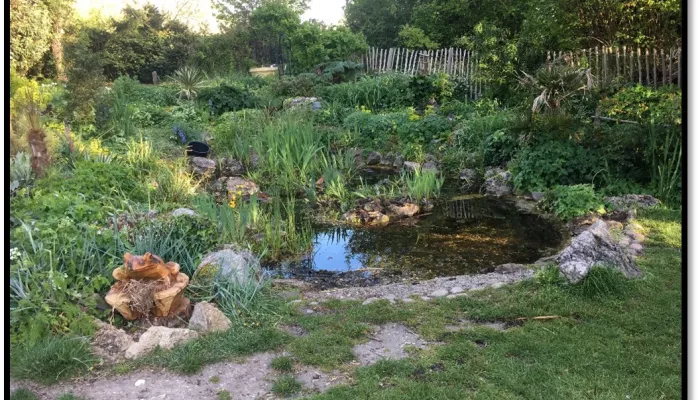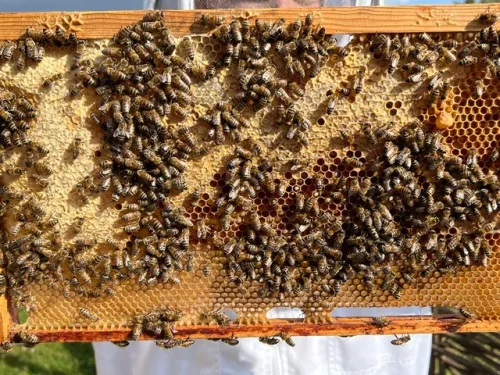
Visit England announces Kent Wildlife Trust in shortlist for Awards for Excellence finalists for 2024
VisitEngland has announced the finalists who will go forward to compete for the tourism industry’s annual national Awards for Excellence.

Judges commented that the standard of this year's awards was the highest yet, and made the judging process tougher than ever. However, there were some standout entries with some excellent examples of projects being undertaken across the region to create a wilder Kent.
One standout entry was gold award winner Communigrow, a sustainable food education charity based in East Malling that shows children, young people and adults how to grow fresh food in a chemical-free, sustainable way, working in partnership with nature to benefit their local community and the environment. In 2023 the charity extended their wetland habitats and planted a range of native hedges and trees, increasing habitats for a range of wildlife. They also run a range of workshops for local people, ensuring the positive impacts of their work are felt far and wide by the community.
Another charity, Spadework also reached the gold standard this year. The West Malling charity provides enriching experiences for adults with a range of needs, helping them live happier, healthier and more fulfilling lives. Horticulture forms a large part of their provision and sustainability and environmentalism is a theme that runs through all they do. Spadework has enhanced their habitats for wildlife, including having larger areas of long grass and a greater selection of wildflowers planted across the site. Oil consumption has completely stopped on site and battery-powered electric mowers are now used and they have been working with a range of schools to provide forest school programmes.
A solar-powered effort led Broadstairs College, part of the East Kent College group, to receive gold standard recognition. Judges commented that they have made tremendous efforts towards sustainability and carbon reduction, in particular. Their “Our Future” campus building currently has 20 solar panels on the roof, with the rest of their energy coming from a green energy supplier. There have also been substantial efforts made to reduce the amount of waste produced on-site, with the Student Union taking an active role in removing single-use bottles from campus and single-use cutlery from the cafeterias. Food waste is actively composted on-site and is used in the on-site allotments, used by both students and the local community. On top of all of the above, students have had the opportunity to work with local communities in contributing to the upkeep of a small patch of local woodland.
Brabourne CEP, a small school with only 105 pupils also took the top step of the podium, achieving gold for their passion in teaching pupils about nature. This year, pupils got the chance to take part in the Mayor of Ashford’s annual Eco debate at the Chamber of Commerce as well as debating in school the relative green credentials of political parties’ recent manifestos for the general election. Judges were impressed by how well this school has collaborated with others to help make wilder spaces for all, including working with local volunteers, the Brabourne & Smeeth gardening society and local builders on numerous Ground Force Days, making every space available conducive to promoting nature.
Heath Farm School in Ashford, a specialist school catering for young people with a range of SEMH needs, also struck gold! Their entry contained a wide range of truly inspiring stories and unique ideas including creative thinking when transforming a flooded field into a bog garden. Last year, secondary students displayed a “Bug Barrel” at the RHS Hampton Court Flower Show and this year supported primary pupils in showing their “Living Lawns Project” at the same show. They have worked with the Community Rail Project and the Parish Council to create a nature garden at Charing Station. Their newly planted hedges and trees also attracted a hibernating dormouse!
Pennies Nurseries in Maidstone has been part of the Wilder Kent Awards since 2021, progressing from a silver to a gold in 2022 and maintaining that terrific effort for the past 3 years. At both their Hockers Lane and Newnham Court sites, they work hard to create habitats for a variety of wildlife and always look to include their young children in the process, having them plant seeds, grow their own produce and put out food for birds over winter. Engaging children at such a young age in wildlife and nature is so important and Pennies should be incredibly proud of the actions they are taking.
Wellesley Haddon Dene, Broadstairs first applied for a Wilder Kent Award in 2022, achieving a bronze, which progressed to a silver in 2023 and now gold. Driven by a passionate cohort of pupils and an even more passionate teacher, they have achieved some great things in 2024, including organising their own Restore Nature Now march in Ramsgate, on the same day Chris Packham and others were hosting one in London. Within their community, Wellesley Haddon Dene have also been incredibly supportive of other schools, supporting them in their Wilder Kent Awards journeys and helping to spread the message of a Wilder Kent.
Kent Wildlife Trust’s Tom White, said: "We were absolutely bowled away by both the quantity and quality of this year's entries. The work that is going on in the county to create a wilder Kent is outstanding.
“When we are constantly faced with negativity about the nature and climate emergencies, it can be overwhelming, but here are 87 projects that are making a significant difference to the people living in Kent from which around 120,000 would have benefitted. From community gardens to schemes to tackle food waste and other harnessing renewable energy, these awards empower people, and demonstrate that we all have it in us to do something special that makes a difference."
The event also encompassed the Trust’s Volunteer of the Year Awards which opened with a tribute to Bill Hickmott, a former recipient of the award who sadly passed away two weeks before the event. Bill was one of the charity's longest-serving volunteers having started with the trust in the 90s and despite being over 80 years old, was still volunteering at Tyland Barn, just weeks before his passing. Bill did so much to create a wilder Kent and will be sadly missed, a montage of photos was shown to the audience which was met with a heartfelt round of applause.
Two volunteers received top honours. Ashford Green Team and Swale Task Day volunteer Dennis Fryer and Darland Banks Reserve volunteer, Lynda Taylor.
In the Team of the Year category certificates were handed out to the Shoresearch Citizen Science Team, Sevenoaks Green Team and Wild About Gardens Team.
A surprise for host Rob Smith concluded the presentation when he was honoured for his hard work producing the Trust’s Talk on the Wild Side podcast.

VisitEngland has announced the finalists who will go forward to compete for the tourism industry’s annual national Awards for Excellence.

A college that scooped a Wilder Kent Award earlier this year has been awarded a $150,000 prize for climate innovation at the COP28 summit in Dubai.

Stunning images showcasing Kent’s wildlife have been chosen as winners in the Wilder Kent Photography Competition.